by
Donald Prothero, Nov 23 2011
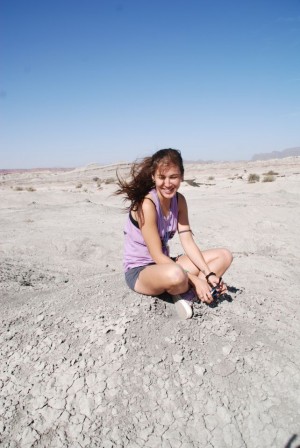
JIngmai O'Connor '04 collecting fossils in the Triassic Ichigualasto Formation, Argentina
A teacher affects eternity; he can never tell where his influence stops.
—Henry Adams
In teaching you cannot see the fruits of a day’s work. It is invisible and remains so, maybe for 20 years.
—Jacques Barzun
Having taught at small liberal arts colleges (first Vassar, then Knox College in Illinois, now Occidental College in Los Angeles and also Caltech in Pasadena) for over 30 years now, I’ve experienced all sorts of highs and lows. Sure, there are the bored unmotivated students, the nasty administrators and colleagues, the grind of teaching all my own labs with no help, and teaching the same intro courses year after year, the low pay for long hours with no support for research, the difficulty of getting any time off from teaching to attend essential professional meetings. But there are also the pluses: flexibility of schedule, freedom to teach what I want to teach with minimal interference from above, the small classes where I really get to know the students, and can make sure they understand the material,
But the best benefit of all is the outstanding students who want to do research as undergrads. Since we have no grad program, for years I’ve been treating undergrads as grad students and getting them involved in research. I include them in my field crews or museum research trips (where they find their own projects), help them attend professional meetings and do their own presentations, and help them publish their research. I’ve had many such students over the years, including over 50 different student coauthors on quite a few of my papers. Some, like John Foster ’89, have made it professionally (he’s Curator of Paleontology at the Museum of Western Colorado), and many others are working in environmental or energy firms, earning twice what I make. One never knows how you change the lives of your students when you work closely with them. Of the recent grads, Linda Donohoo-Hurley ’00 finished her Ph.D. at Univ. New Mexico—and I inadvertently introduced her to her future husband, John Hurley, when she presented our research at a Penrose Conference I organized. Others are about to finish their doctorates. These include Jonathan Hoffman ’03, who came specifically to study with me (M.A. at Florida, nearly done with his Ph.D. at Wyoming); Josh Ludtke ’04. who took care of my eldest son at times (M.S. at San Diego State, finishing his Ph.D. at Univ. Calgary); and Kristina Raymond ’08, just finishing her master’s at ETSU. Our program is small (only 3-7 graduating geology seniors each year, yet we have 5 full-time tenured faculty), but we turn out a lot of good grad students per capita.
Continue reading…
comments (12)
by
Donald Prothero, Sep 28 2011
Two weeks ago, I did a whirlwind 39-hour trip to the Bay Area to give two different talks (one to the Bay Area Skeptics in their Chilean restaurant hangout) and also to study some fossils at the University of California Museum of Paleontology for my ongoing peccary research. It was great hanging out in the People’s Republic of Berkeley again, enjoying the incredible ambiance of Telegraph Avenue, the colorful characters on Shattuck, the amazing array of ethnic restaurants block after block, the classic “woo” of all the Eastern mystic temples, and palmistry and naturopathy and New Age shops, the chirping cross-walk warnings, and PC reminders everywhere—and seeing all the homeless people rooting through the garbage. It’s like a time warp for me, reminding me of when I first visited as a student in the 1970s—except that the hippies are still here, a bit older and grayer, but now becoming psychedelic relics. Many parts of town still have the spirit of the “Summer of Love” while others are punk or goth or hip-hop. It’s eye-opening to see the sign at the city limits proclaiming Berkeley a “nuke-free zone”(not that it matters, since there are no nuclear reactors or military bases there, and the nuclear physics is done out at Lawrence-Livermore lab). Every time I go to one these college towns where the Sixties never ended and lots of hippies have gone to live (not only Berkeley, but also Eugene, Boulder, and Santa Cruz), I have an incredible rush of memories of that time, and the dreams my generation fought for. As a Boomer myself and child of the Sixties, it’s great to see that not every aspect of it has been forgotten or dismissed (especially not the music, of course, which has remarkable resilience).
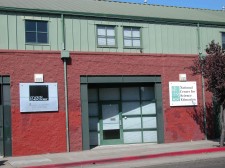
The terrifying fortress headquarters of the "Evil Empire"
After finishing my research on the fossils, I had a bit of spare time, so on invitation from Steve Newton and Josh Rosenau (who attended my Bay Area Skeptics talk), I decided to pay a visit to another cultural landmark: the headquarters of the National Center for Science Education. This is the chief non-profit organization in the U.S. that helps local school boards and scientists and teachers when creationism threatens their classrooms. If you read the creationists’ literature and the posts on the ID creationist Discovery Institute’s (DI) website, the NCSE is this monstrous organization which exerts mind-control over every scientist in the country, and forces them to robotically chant “I accept evolution.” According to the creationists, the NCSE is pure evil, suppressing the creationism message with its enormous staff and budget and power over all of U.S. science. In Ben Stein’s crappy little creationist propaganda film Expelled, Ben pays a visit to the gleaming headquarters of the Discovery Institute in Seattle, which occupies a vast amount of floor space in a brand-new office building downtown, and has a huge staff. Over and over again the DI staffers complain about how they scientific establishment is against them, and how the NCSE has so much more power, money, and influence than they do.
Continue reading…
comments (22)
by
Daniel Loxton, May 24 2011
As most of you will have heard, Christian radio mogul Harold Camping's predicted “Rapture” came and went on May 21st without so much as a trumpet sounding. This failure of prophecy unfolded to a clamour of Tweets and parties from the nonbelievers' side of the aisle. There's something undeniably funny about a confident prediction unfulfilled, and Camping's prediction couldn't have been much more confident: “We know without any shadow of a doubt it is going to happen.”
Still, personally, I had a hard time enjoying the circus. It seemed ghoulish to crack wise when so many hopes and dreams — and lives — hung in the balance. Belief, as we skeptics know all too well, cuts across lines. Beliefs unite the clever and the dull, the young and the old, the righteous and the wicked. Camping's fear-mongering meant good people sold homes, quit jobs, broke up families, or spent the college money on apocalyptic billboards. I worried especially about the kids lying awake that week waiting for the end of the world, just as I worry about the kids suffering artificial, unnecessary terror over 2012.
Continue reading…
comments (58)
by
Brian Dunning, May 19 2011
 The latest from No Starch Press is another in their series of Manga guides, three of which I’ve reviewed here before (The Manga Guide to Calculus, and the Guides to Physics and Statistics). The idea is a simple one: Teach a subject that’s normally dry and boring, but do it in a narrative comic book format that provides so much fun you’re not even aware that you’re learning. That’s the idea, anyway.
The latest from No Starch Press is another in their series of Manga guides, three of which I’ve reviewed here before (The Manga Guide to Calculus, and the Guides to Physics and Statistics). The idea is a simple one: Teach a subject that’s normally dry and boring, but do it in a narrative comic book format that provides so much fun you’re not even aware that you’re learning. That’s the idea, anyway.
It’s a good idea, in my opinion, but executed in a, well, pretty thin way. I wanted to like these books a lot (as an anime fan), and they’re OK. The thing is that relativity and all its funky cool effects (time dilation, changes in mass, etc.) can make great plot points. I’d expect these stories to be action adventures, where the physics of what’s happening play active roles in the story, and the characters need to understand and predict what’s going on. Learning on the fly, with millions of lives at stake! Continue reading…
comments (7)
by
Daniel Loxton, Apr 26 2011
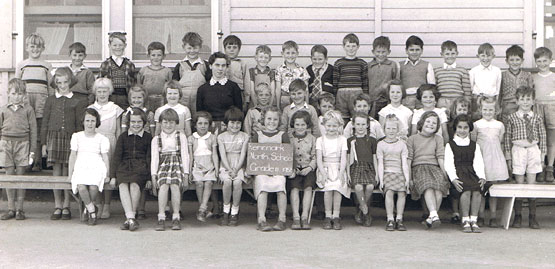
Renmark North School, Grade 2, 1956. South Australia. Photo provided by Bonnie Poulter
[This week, I'd like to share a story excerpted from my recent LogiCON keynote. The speech is a bit on the personal side, as I'm sure you'll be able to tell. Much of it has to do with my own childhood. —Daniel]
My father has always been a wonderful storyteller.
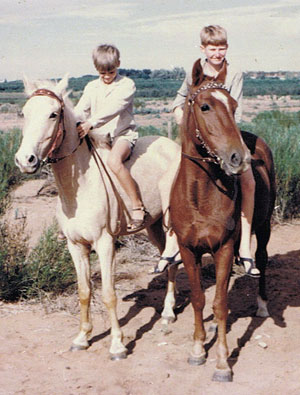 When my brothers and I were little, my Dad would tuck us into our beds, “bristle” our cheeks with his stubble, and tell us stories or poems. We loved Australian bush poetry (we must have heard “Mulga Bill's Bicycle” and “The Man From Ironbark” a thousand times), but our favorites were tales of his own childhood, growing up poor on the edge of the desert in South Australia. His Tom Sawyer-like childhood sounded magical to us: racing horses bareback over red sand, plucking oranges from the trees of his family's tiny fruit farm, catching yabbies in the hidden backwaters of the River Murray.
When my brothers and I were little, my Dad would tuck us into our beds, “bristle” our cheeks with his stubble, and tell us stories or poems. We loved Australian bush poetry (we must have heard “Mulga Bill's Bicycle” and “The Man From Ironbark” a thousand times), but our favorites were tales of his own childhood, growing up poor on the edge of the desert in South Australia. His Tom Sawyer-like childhood sounded magical to us: racing horses bareback over red sand, plucking oranges from the trees of his family's tiny fruit farm, catching yabbies in the hidden backwaters of the River Murray.
Many of these stories had a subversive edge to them, I realize now. Many were direct lessons in skepticism.
Continue reading…
comments (22)
by
Daniel Loxton, Apr 12 2011
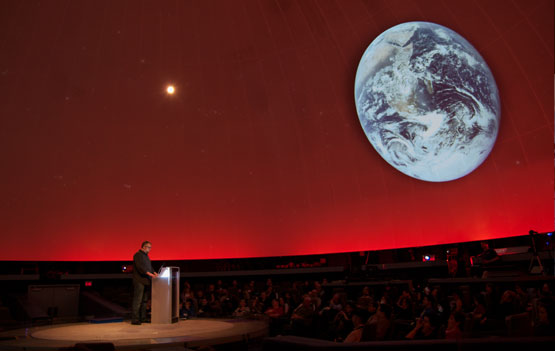
Daniel Loxton Keynote Address at LogiCON 2011. Photo by Mark Iocchelli
Last weekend I was honored to deliver the keynote address at LogiCON, a skeptical event held at Edmonton’s Telus World of Science. It’s an amazing facility, and it was an inspiring event.
LogiCON
Organized by the Greater Edmonton Skeptics Society, LogiCON 2011 was a curated sequel to (and departure from) a successful 2010 event built on the open SkeptiCamp model.
Billed as “Critical Thinking for Everyone,” LogiCON was explicitly conceived and promoted as a science outreach event rather than as a rally for self-identified skeptics. Though it incidentally did bring together Edmonton’s skeptical community, it was designed first and foremost to introduce the public to science-based approaches to evidence in general — and to many paranormal claims in particular. Continue reading…
comments (13)
by
Daniel Loxton, Mar 29 2011
 On April 9th, 2011, I’ll be honored to speak at Edmonton’s Telus World of Science as a featured part of the lineup for LogiCON 2011. Billed as “Critical Thinking for Everyone,” LogiCON is a new conference with a novel approach. It attempts to combine the accessibility achieved by the wildly successful SkeptiCamp model with the strengths of a curated event. To help with accessibility, all LogiCON sessions are open at no extra cost to anyone who pays the general admission price for the Telus World of Science on April 9th.
On April 9th, 2011, I’ll be honored to speak at Edmonton’s Telus World of Science as a featured part of the lineup for LogiCON 2011. Billed as “Critical Thinking for Everyone,” LogiCON is a new conference with a novel approach. It attempts to combine the accessibility achieved by the wildly successful SkeptiCamp model with the strengths of a curated event. To help with accessibility, all LogiCON sessions are open at no extra cost to anyone who pays the general admission price for the Telus World of Science on April 9th.
Continue reading…
comments (4)
by
Daniel Loxton, Oct 26 2010
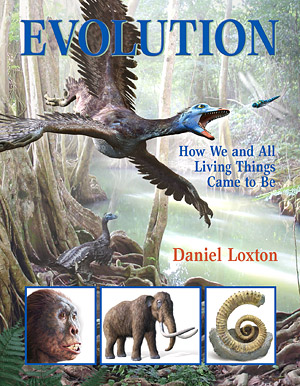 I'm elated to announce that my Junior Skeptic-based book Evolution: How We and All Living Things Came to Be is a 2011 nominee for the prestigious Silver Birch® Nonfiction Award! This is a tremendous honor (for which I thank my illustration collaborator Jim W. W. Smith, my editor Valerie Wyatt at Kids Can Press, producer Pat Linse — and the Skeptics Society for making the project possible in the first place).
I'm elated to announce that my Junior Skeptic-based book Evolution: How We and All Living Things Came to Be is a 2011 nominee for the prestigious Silver Birch® Nonfiction Award! This is a tremendous honor (for which I thank my illustration collaborator Jim W. W. Smith, my editor Valerie Wyatt at Kids Can Press, producer Pat Linse — and the Skeptics Society for making the project possible in the first place).
Each year, the Ontario Library Association showcases selected titles for its Forest of Reading® program — a heavily-promoted recreational reading initiative, widely supported throughout Ontario's public schools and public libraries. Among the 250,000 participating young readers, kids who read a minimum of five of the 10 books in their reading category will become eligible to vote for the award in that category.
The Forest of Reading program runs throughout the Spring, culminating with award ceremonies in front of an audience of several thousand at Canada’s largest literary event for younger readers: the Festival of Trees™ at the Harbourfront Centre in Toronto (May 11 and 12, 2011).
Continue reading…
comments (26)
by
Daniel Loxton, Jul 26 2010
by
Daniel Loxton, Jun 08 2010
 As a child in the 1970s and 80s, I often had an experience which must have been even more familiar to children of the 1960s: lying awake at night, alone in my room, paralyzed with terror about nuclear armageddon. In those Cold War days, the end of the world seemed oppressive and omnipresent, especially for a child. Every Hollywood movie, every news story about the arms race and the Doomsday Clock seemed to whisper in my ear at night, “It could happen at any moment. It could happen before you wake up.”
As a child in the 1970s and 80s, I often had an experience which must have been even more familiar to children of the 1960s: lying awake at night, alone in my room, paralyzed with terror about nuclear armageddon. In those Cold War days, the end of the world seemed oppressive and omnipresent, especially for a child. Every Hollywood movie, every news story about the arms race and the Doomsday Clock seemed to whisper in my ear at night, “It could happen at any moment. It could happen before you wake up.”
Not every kid my age had that fear, but many did — I think probably millions. Perhaps you were one of the kids who felt yawning horror at each unexpected flash on the horizon, or relief at the sound of ordinary thunder? Continue reading…
comments (40)





 When my brothers and I were little, my Dad would tuck us into our beds, “bristle” our cheeks with his stubble, and tell us stories or poems. We loved Australian bush poetry (we must have heard “Mulga Bill's Bicycle” and “The Man From Ironbark” a thousand times), but our favorites were tales of his own childhood, growing up poor on the edge of the desert in South Australia. His Tom Sawyer-like childhood sounded magical to us: racing horses bareback over red sand, plucking oranges from the trees of his family's tiny fruit farm, catching yabbies in the hidden backwaters of the River Murray.
When my brothers and I were little, my Dad would tuck us into our beds, “bristle” our cheeks with his stubble, and tell us stories or poems. We loved Australian bush poetry (we must have heard “Mulga Bill's Bicycle” and “The Man From Ironbark” a thousand times), but our favorites were tales of his own childhood, growing up poor on the edge of the desert in South Australia. His Tom Sawyer-like childhood sounded magical to us: racing horses bareback over red sand, plucking oranges from the trees of his family's tiny fruit farm, catching yabbies in the hidden backwaters of the River Murray.
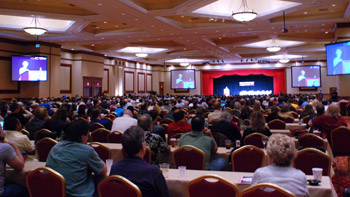 The Amazing Meeting (TAM) conference in Las Vegas is always the center of the skeptical universe, and TAM8 was no exception. Bigger and more representative than any previous year (it was
The Amazing Meeting (TAM) conference in Las Vegas is always the center of the skeptical universe, and TAM8 was no exception. Bigger and more representative than any previous year (it was  As a child in the 1970s and 80s, I often had an experience which must have been even more familiar to children of the 1960s: lying awake at night, alone in my room, paralyzed with terror about nuclear armageddon. In those Cold War days, the end of the world seemed oppressive and omnipresent, especially for a child. Every Hollywood movie, every news story about the arms race and the
As a child in the 1970s and 80s, I often had an experience which must have been even more familiar to children of the 1960s: lying awake at night, alone in my room, paralyzed with terror about nuclear armageddon. In those Cold War days, the end of the world seemed oppressive and omnipresent, especially for a child. Every Hollywood movie, every news story about the arms race and the